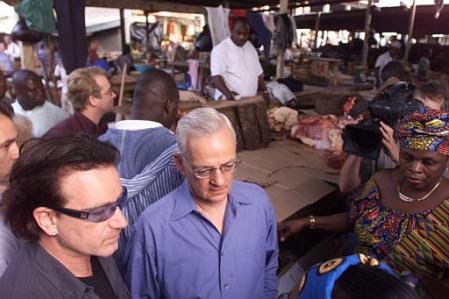 Bono, O'Neill Off to Uganda
News24, May 26, 2002
Vincent Mayanja
Kampala -- Irish rock star Bono and U.S. Treasury Secretary Paul O'Neill were due to start a three-day visit to Uganda on Sunday, the third leg of an unusual tour focusing on HIV/AIDS and the efficacity of aid relief in Uganda.
As in their earlier visits to Ghana and South Africa, the U2 frontman and O'Neill were to hold talks with political leaders, including President Yoweri Museveni and top government economic officials.
The duo was also expected to give speeches at the country's main Makerere University highlighting the U.S. government's strong commitment to economic reforms and visit HIV/AIDS related projects.
They were expected to use their visit to determine conditions on the ground in Africa, which should help establish the criteria for future U.S. aid disbursement under President W. George Bush's new aid initiative.
That initiative seeks to increase U.S. unilateral development aid by $5 billion a year by 2006 to $15 billion.
Uganda is one of the world's leading success stories in fighting HIV/AIDS, with infection rates reduced from 30% in the 1980s to about 6% today.
Two million AIDS orphans
It is estimated that up to 800,000 people have died of AIDS in Uganda since it was diagnosed in the early 1980s, while 1.8 million are living with the virus.
Up to two million children have been orphaned by the deadly disease.
Bono and O'Neill were to visit projects including water plants and schools that are being funded by the World Bank and International Monetary Fund's debt relief programme for Highly Indebted Poor Countries (HIPC).
Uganda has benefitted more than any other from donor funding than most other countries in Africa.
Uganda's debt relief adds up to $55 million a year for the five years to 2004, while debt service relief from all Uganda's creditors under the HIPC stood at $1.3 billion two years ago.
Some $650 million was provided under the original debt relief scheme, while the total debt service is to yield roughly $2 billion.
Ugandan officials say the savings from the debt relief are mostly being committed to education, safe water and other poverty reduction measures.
Recuiting teachers
"The money goes into recruiting more teachers for primary education, accelerated classroom construction and the provision of water and sanitation," a finance ministry official said in an interview on Saturday.
Since the introduction of universal primary education in 1996, the number of children attending school has shot up from 2.5 million to an estimated seven million. But classroom construction and teacher recruitment has not matched the increase in pupils.
O'Neill was scheduled to visit one of the primary schools.
He and Bono leave Uganda on Tuesday evening for the Ethiopian capital, Addis Ababa, to attend an African Development Bank meeting that will also discuss the New Plan for African Development (Nepad), an initiative which offers good governance in return for aid and investment.
© News24, 2002.
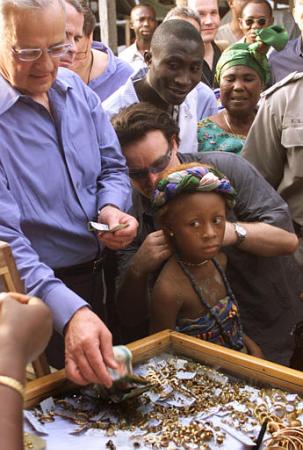
Africans Indifferent to Bono-O'Neill Visit
VOA News, May 28, 2002
Luis Ramirez
Africans are giving mixed reviews of the visit to Africa by Treasury Secretary Paul O'Neill and rock star Bono, of the Irish rock band U2. The visit is prompting new reflections on the image that many Africans have of the United States.
The Bush administration recently pledged to increase aid to Africa by up to $5 billion. The aim of Secretary O'Neill's visit is to give the United States a better sense of where and how some of that aid would be better spent.
The 11-day, four-nation tour began last week in the west African nation of Ghana. The itinerary through Ghana, South Africa, Uganda and Ethiopia, includes visits to markets, AIDS project facilities and private industries where donor money has been put to use.
Except for the countries where Mr. O'Neill and Bono are stopping, news of their visit has drawn little public attention, hardly appearing in newspapers in French-speaking nations.
Bono has been an outspoken advocate in the fight against poverty and AIDS. Secretary O'Neill said he invited the Irish rock singer to join him on this trip to provide insight on the issues. U.S. officials also hoped that the presence of Bono, who is 42 years old, would appeal to young people in Africa.
But few Africans are fans of U2. It is African pop music that rules the airwaves. Magazine columnist Samuel Doe Ablordeppey in the Ghanaian capital, Accra, has said many young people had never heard of the Irish rock band or its lead singer before he touched down in Ghana.
"Most people did not know so much about his background. They did not know he was a singer. So, we saw many of the radio stations taking their time, painstakingly trying to brief people about his background. They were interested. They were phoning. People have written letters, commenting on his coming," he said.
This 25-year-old Ghanaian, who asked not to be named, said he was puzzled by what he said was an unlikely duo of the Treasury Secretary and an Irish rock star. "I know and I read it in the paper that he was accompanied by the rock star, but for me, I do not have any interest in rock, so I do not know [what] the main aim [was] of accompanying him to the country," he said.
What has appeared to attract the attention of many people here is the fact that the U.S. government has sent one of its top officials to assess the needs of Africans. The two have received warm welcomes in all nations where they have stopped thus far.
Generally, Africans tend to see America as generous well-intentioned, albeit much less engaged in Africa than other rich nations of the world. According to the Organization for Economic Cooperation and Development, the United States ranks third behind France and Germany in the amount of aid it provides to sub-Saharan Africa. Some think the United States should be helping more.
Secretary O'Neill brought with him a sharp message that all U.S. aid should be accounted for, and that tangible results, such as visible improvements in the standard of living, need to be produced. Mr. O'Neill, who is a former corporate executive, has also insisted that aid should take the form of careful investment and trade incentives rather than direct handouts.
Bono, on the other hand, has said repeatedly on this trip that more needs to be spent on humanitarian and direct-aid programs.
Ghanaian economist Kuame Piannim in Accra said that for many African countries like his own, it is a case of needing money to make money. He said Ghana needs both direct aid and investment to develop.
"We need both. We need aid to build our infrastructure. Our telecommunications sector is weak. Our road network is weak. We need to be able to strengthen our school system to provide the right type of human resources to fill the employment opportunities that will be coming up. We need to develop the infrastructure and keep the enabling environment sound so that we can invite investment. By investing, you reduce the perceived risk and the high cost of business to the American investor. So I think we need both," Mr. Piannim said.
Much remains to be done to boost commercial ties between the United States and Africa. Currently, the African continent accounts for only four-percent of U.S. trade with developing nations.
In French-speaking countries of West Africa, where the O'Neill and Bono visit got much less publicity, the view of Americans remains skeptical, and some say realistic.
A businessman in Ivory Coast's main city, Abidjan, said he is pleased that the United States is making overtures toward Africa. But the businessman, who identified himself only as "Adama," said he believes any aid that comes will not be a giveaway.
He said, "Americans do not help African countries without demanding something in return. For Americans, it is business first." Adama said, "They say 'Do business with us, and we will help you.' On the contrary, the Japanese or the French, they aid Africa with donations and loans. But Americans," he said, "they are interested only in exchanges. Americans are interested in countries that produce oil and gas.
Last week, the Bush administration allowed Ivory Coast to become the 36th Sub-Saharan African nation to become eligible for special trade benefits with the United States, under the U.S. law known as the African Growth and Opportunity Act.
Magazine columnist Samuel Doe Ablordeppey in Accra says it is through engagement that U.S. aid will truly help Africa. "If you teach somebody to fish, you help him more than giving him fish. So in the same way, you teach people to develop skills, the initiative, the capacity to think for themselves and come out with programs. That is more important than every time giving them grants and loans and directing them as to how to use it. So when you know how to use it, then I think the problem will be half-solved," he said.
The effects of the O'Neill-Bono trip will not be known until Secretary O'Neill returns to Washington and presents an assessment of his findings to the administration.
Many Africans hope the visit will at least serve as a first step in building a new partnership between Africa and the United States.
© VOA News, 2002.
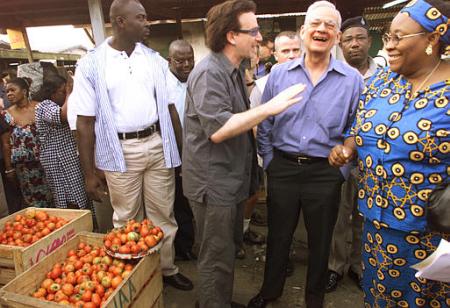 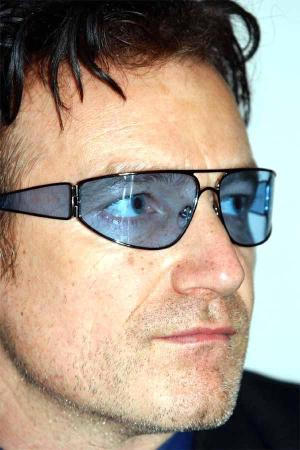 When a Rock Star Goes Political
The New York Times, May 28, 2002
Ann Powers
Bono, the Irish rock star, may look silly running around Africa with Treasury Secretary Paul O'Neill, wearing those blue Romeo Gigli shades and black Prada boots, acting as if he deserved to be taken seriously. But Bono, in the midst of his fact-finding tour of Africa, has garnered good reviews for his lobbying efforts for world debt relief. Still, beneath that praise you can hear the surprise about how well educated he is about his cause; in the eyes of the establishment he remains a charmingly inappropriate ambassador. Despite evidence that artists can affect public policy on serious matters, there's still the lingering sense -- if not among politicians, then among media commentators -- that celebrities make gestures toward social change while real power is retained by the grownups in corporate boardrooms and government.
Of course Bono plays up the incongruity of his growing political role, joking about the soup stains on his unworn tie. But the idea that an artist like Bono would be an effective diplomat is far from odd. Bono has been involved in fighting African poverty for almost 20 years, since he first spent six weeks volunteering in an Ethiopian refugee camp. His political work has made him an important and vocal advocate for aid for developing nations. His work with Amnesty International, Greenpeace and antinuclear efforts in Great Britain have been substantial. But he's not alone; he follows a long line of pop artists who have left a mark on politics. Pop artists like Bob Geldof, the organizer of the 1985 Live Aid concert for famine relief and a close Bono adviser, and Willie Nelson and the other organizers of Farm Aid have been raising money for their causes for years. In America, entertainment and political action have never been far apart. Dr. Martin Luther King turned to an actor and singer, Harry Belafonte, to help lead landmark protests including the 1963 march on Washington. Since the 1960's, celebrity-led charities and causes have been standard forms of activism. The difference now is that celebrities like Bono are less likely to be protesting in the street and more likely to be testifying to big, rapt audiences in Congress -- a sign that activism by popular artists is taken more seriously now than ever. Popular music can still be a forum for rebellion -- don't forget Eminem -- but older artists especially are developing more sophisticated approaches to social change. In 1994, it seemed strange that members of Pearl Jam took their struggle against Ticketmaster to the halls of Congress. More recently, Don Henley and Alanis Morissette have been prominent figures there, lobbying for artists' interests and rights on the Web. Of course, these musicians don't entirely abandon their rock 'n' roll attitudes when they talk to politicians; after all, it's fame that got them in the door. But now being cool means being able to talk policy and defy condescending expectations. With a keen political sense, Bono is taking activism to a new place.
Beyond his interest in alleviating third world poverty is perhaps another agenda: the establishment of a larger social role for popular artists. His message carries with it a variation on rock-star excess; instead of being the most drugged-out or sexed-up among us, he's the most idealistic. Rock stars are like the tricksters in mythology, born to confound categories.
Bono can use celebrity to do what political figures, whether senators or street activists, can't easily do: retain a radical edge while making alliances with a conservative base. This approach isn't surprising for the leader of a band with roots in progressive Christian activism, always with a strong dose of expressive faith. U2's shows are still the most theatrically transcendent performances on the arena-rock circuit. The actual impact of Bono's leap into global politics remains to be seen. In any case, he is taking on the role of rock star as policy wonk at the very moment when the world is ready to believe in it.
© 2002 The New York Times.
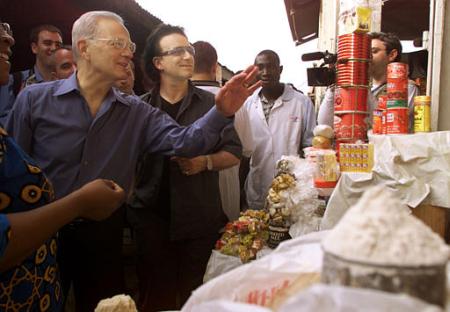 On the Road With Bono and O'Neill
On their tour of Africa, the rock star hopes to convince the Treasury secretary of the value of more U.S. aid
TIME.com, May 29, 2002
Adam Zagorin
Tuesday, May. 28, 2002
As the motorcade pulls up and Secret Service agents fan out, the children of Wamili, a village of mud and grass huts in the north of Ghana, break into song. The tribal chief welcomes Bono, leader of the rock band U2, and his traveling sidekick, Paul O'Neill, the buttoned-down U.S. Treasury secretary. Each is presented a traditional robes and a matching floppy hat. Bono's fits nicely. O'Neill's seems several sizes too small. The chief looks apologetically at the Treasury secretary and says, "I think one of you got a bigger one." To which Bono replies with a smile, "No, just a bigger brain."
Africa hasn't seen a celebrity road show like this one since Stanley met Livingstone. The world's most powerful finance minister and one of the world's biggest rock stars are on a grueling, 10-day race through Ghana, South Africa, Uganda and Ethiopia that will bring them face to face with grinding poverty in a region home to 70% of the world's cases of AIDS as well as controversial development projects designed to alleviate the suffering. Flying on a chartered jet known as "Great Expectations" when George W. Bush used it as a campaign plane, the unlikely pair have an entourage of senior policy wonks and PR advisors as well as representatives from the Financial Times - and Rolling Stone and MTV.
Like heroes in a buddy movie, opposites attract. Striding through Accra's sprawling Makalo market past mounds of fresh pineapple, peppers and salted fish, O'Neill wears black tassel loafers and gray slacks; Bono sports a rumpled safari shirt and his trademark blue wraparound sun glasses. O'Neill, the former head of Alcoa, interrogates vendors on the economics of their business, trying to figure out the impact more U.S. aid might have. Bono walks up to a merchant selling psychedelic tie-died textiles and asks, "Have you ever heard of Jerry Garcia?" When O'Neill's microphone goes awry in Ghana's presidential palace, Bono rushes to adjust it. And the duo gleefully exploit their differences to attract even more attention. The trip was hardly a day old when Bono began taunting the Treasury secretary, a notorious neatnik, to play Oscar to his Felix. "We're the odd couple."
But if the jokes seem impromptu, the serious part of the script is more predictable. Bono hopes to convince O'Neill that wealthy countries should dramatically increase foreign assistance to Africa; O'Neill, a frequent critic of aid money that he claims is wasted, wants to make sure that future U.S. commitments are well-spent. At each stop, Bono presses for more aid, particularly from the U.S. And at each stop, O'Neill demurs. "I think Paul O'Neill is going to be a very different person going out of this trip than he was coming in," Bono told TIME after a visit to an AIDS clinic in the impoverished South African township of Soweto. "He will take a message back to Washington that much more can be done."
True, there are signs that Bush's "compassionate conservatism" will soon include more money for the world's poor. The President, who met Bono for the first time earlier this year, will visit Africa in 2003 and recently announced his "Millennium Challenge," a $10 billion increase in American aid funding over fiscal years 2004-2006. That is more than his Democratic predecessor put on the table, but would still leave U.S. foreign economic assistance the lowest among major industrial nation as a percentage of output. O'Neill is clearly moved by the human cost of Africa's underdevelopment. But the former Alcoa CEO remains hard-nosed about handing out more cash when billions of dollars in economic aid have frequently failed to produce growth over the last 50 years. As O'Neill puts it, "These problems are solvable...and may even be doable with resources that are already available." Translation: there's no guarantee of extra U.S. money.
Still, Bono keeps working. During a visit to a school in an Accra slum, a teenage girl asks him to sing, something he rarely does in public away from the concert stage. But this time he makes an exception. Leading scores of children, his hoarse voice unleashes the chorus of "I Still Haven't Found What I'm Looking For." And the tour rolls on.
© 2002 Time Inc.
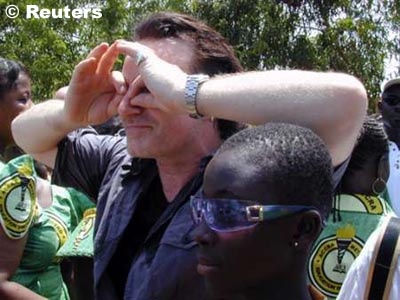  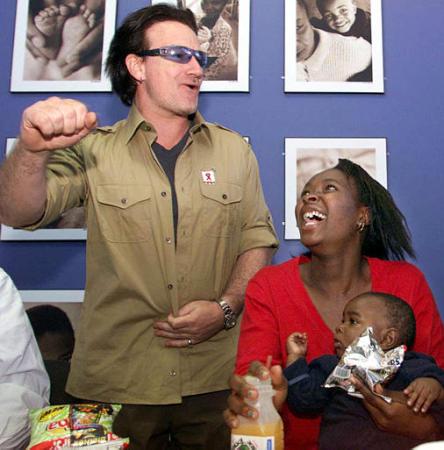 |  |
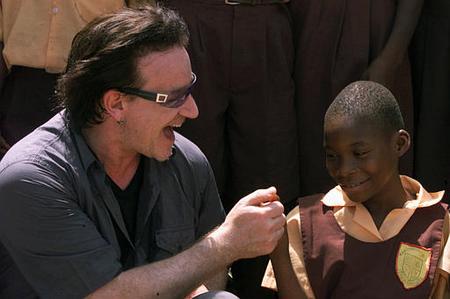 The Bono-O'Neill World Tour
Editorial /Opinion
Boston Herald, May 26, 2002
Those two traveling companions, U.S. Treasury Secretary Paul O'Neill and singer Bono, might make up the oddest of odd couples since Felix and Oscar.
Conventional wisdom is that each can learn a lot from the other. Maybe so, but we hope Bono's ears aren't too damaged by years of reverb to hear what O'Neill has to say.
An alumnus of the Live Aid famine relief concert of 1985, the ever-altruistic Bono believes as strongly as ever that the industrial world must help impoverished and disease-ridden Africa. To show he's not all talk, he has even set up his own relief organization, DATA (Debt, Aid, Trade for Africa) and for that he deserves more applause than he gets on stage fronting U2.
And O'Neill -- well, he isn't unsympathetic to Third World plight. He's just pragmatic enough to have reservations about Bono's proposals, some of which might actually worsen life for the average African in the long run. Evidence of that lies in some of Live Aid's efforts.
Africans weren't simply starving during the mid-1980s. Many were being starved by despots bent on solidifying power. Much of the donated food wound up in the hands of those despots, which only strengthened their death grips on the masses. And often food spoiled before it could be distributed.
Now Bono campaigns for debt relief. Sure enough, many African countries will be hard pressed to develop economically while they're in hock for billions of dollars in loans and grants. Yet much of that was spirited away by kleptocrats. Basic economic incompetence accounted for much of the rest.
Bono retorts that the sins of the fathers should not be passed on to the sons and daughters. No, they should not, but simply forgiving the debt would do those offspring no good. On the contrary, it would absolve the receivers of responsibility, almost guaranteeing more aid would fall into the same bottomless pit.
O'Neill would rather see private-sector initiatives than more blank checks from the World Bank. Of course, for such initiatives to take root, some basic changes would be required among the receivers -- to wit, human rights, democratic and market reforms, education. So far, it's been the refusal of many African leaders to go in this direction -- not the industrialized world's insensitivity -- that keeps so much of the so-called Dark Continent in its unenlightened condition.
© Boston Herald, 2002.
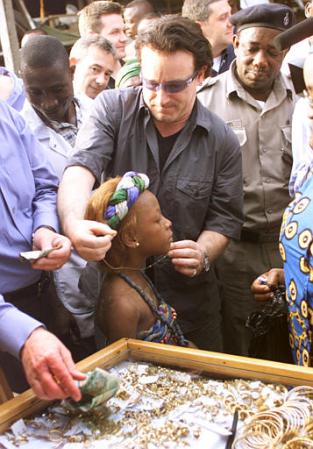 In Uganda, O'Neill and Bono Disagree About Success of Aid
Washington Post, May 28, 2002
Paul Blustein
Wakiso, Uganda, May 27 -- The longer he tours Africa, the more convinced Treasury Secretary Paul H. O'Neill is becoming that massive amounts of aid dollars have gone to waste -- and today, after visiting a poorly equipped primary school and village well, he issued one of his most impassioned blasts ever at aid agencies.
But his traveling companion, the rock star Bono, drew the opposite conclusion from the same school and well. And for the first time in their 10-day trip around Africa, Bono openly questioned the Treasury secretary's grasp of the aid issue.
Uganda is the third of four countries that the oddly matched pair are visiting on their tour, which is aimed at drawing attention to Africa's problems and illuminating the debate over how to overcome global poverty. Today the media-circus atmosphere surrounding the trip intensified as Bono, lead singer for the Irish rock group U2, was joined by movie actor Chris Tucker, along with a crew from MTV. But the day also produced some of the sharpest exchanges so far between O'Neill and Bono.
O'Neill, whose immaculately pressed shirts contrast starkly with Bono's safari garb, has shown deep anguish over the impoverished conditions he has encountered, even while maintaining his long-standing skepticism about the effectiveness of sending large sums to poor countries. A topic that he is becoming particularly exercised about is the apparent inability of aid agencies to help African governments provide their towns and villages with clean water -- a crucial problem because bacteria in water sickens and kills millions of poor people a year, especially young children, who can die from debilitating diarrhea.
During a visit to a well in Wakiso, an area outside of Uganda's capital, Kampala, the Treasury secretary emphasized how cheaply the well had been built, noting that it cost $1,000 and provided clean water to more than 400 people. Using "back-of-the-envelope arithmetic," he said, he and Uganda's central bank governor had calculated the night before that wells serving all of the nation's people could be drilled for about $25 million. He questioned why it couldn't be done within a year.
"Last year the World Bank lent $300 million to Uganda," he said later in the day to a university audience. "What was so important that there wasn't $25 million to $30 million to give everyone in Uganda clean water? Where did the money go?"
During another stop, at a Wakiso primary school, O'Neill voiced exasperation upon being told that during the dry season, the school's students had to carry water four miles, and he was equally outraged to learn that textbooks were so scarce that they had to be shared by an average of six students each.
If people in rich countries "understood that they could give six copies of Dr. Seuss, and then every child would have it, I think we could get people to, in effect, adopt children, and say, 'We're going to make sure that every child has their own book,' " he said to Bono as TV cameras rolled. "I think we need to make this into an individual-people thing, and not some cosmic stuff about billions of dollars" in aid. "This is about real people."
That statement appalled Bono, who had expected to use the well and the school to make the case that poor countries can reap enormous benefits from aid and debt relief if their governments are reform-minded and put the money into sectors such as health and education. The rock star likes to cite figures showing that Uganda, whose government is one of the World Bank's star pupils, has used some of its debt-relief savings to lower school fees, build schools and double enrollments over the past several years.
"It is going to take billions of dollars," retorted Bono, whose real name is Paul Hewson. "We -- not you personally, but the United States and Europe -- can transform the lives of these children by actually getting money to them."
A few minutes later, with O'Neill occupied elsewhere, Bono fumed that many more schools like the one he was visiting had been built because of "organized, government-to-government canceling of debts...in an example of why we need big money for development. And it is absolutely not an example of why we don't. And if the secretary can't see that, we're going to have to get him a pair of glasses and a new set of ears."
Another, more diplomatic demurral to O'Neill's criticism of aid came from Bob Blake, the World Bank's country program manager for Uganda, who responded in a telephone interview to the Treasury secretary's points about the World Bank's failings in the water sector.
The World Bank has long ago learned that simply drilling wells in desperately poor villages such as Wakiso doesn't work, because the wells and pumps often fall into disrepair, Blake said.
"It's more than just having the physical infrastructure; you also need to have systems in place to make sure it's maintained," he said. "That's complicated. I don't want to say it's rocket science, but it requires changes in communities and structures and institutions and so forth."
That typically means establishing committees of local people who are responsible for well maintenance, and supervisory personnel who can inspect wells periodically and monitor the committee's performance.
The World Bank hasn't lent money directly for water projects in Uganda for two years, Blake added, but it is working on the problem through a $150 million "poverty-reduction support credit," which focuses on helping the government improve services.
© 2002 The Washington Post Company.
Enter content here
|
|
 |
 |
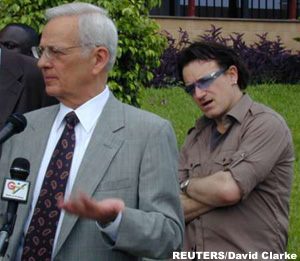 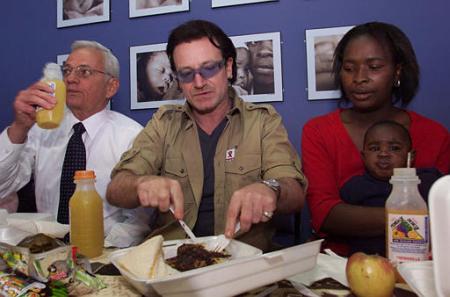 O'Neill, Bono End Africa Tour with Hope, Intentions
Reuters, May 30, 2002
Glenn Somerville
Addis Ababa -- U.S. Treasury Secretary Paul O'Neill and rock star Bono wound up a tour of poverty-stricken Africa on Thursday with a few jokes and a lot of determination to help the continent forge a brighter future.
After nearly two weeks of travel through four African countries, the business-minded Treasury chief and the casually clad rock guru were at pains to emphasize how well they had worked together and how useful they felt the trip was in spotlighting Africa's woes.
"I've really enjoyed the traveling that we've done together and I think you can tell from the way we interact that we really do have a growing bond," O'Neill said outside a sportswear factory on dusty pot-holed streets on the outskirts of the Ethiopian capital.
About one-third of Ethiopia's 60 million citizens live on less than $1 a day.
"It's coming from believing in the same ideals and believing that the world doesn't have to be the way it is where people are not doing well," said the world's most powerful treasury secretary as goats and donkeys wandered past tumbledown shacks.
Bono, in his ever-present blue wraparound sunglasses, is a long-time activist for debt relief and more aid for Africa. He has also at times displayed a deft political hand in dealing with his powerful travel companion.
"He's the man," Bono said, referring to O'Neill's ability to carry a message to Washington on the urgency of Africa's needs.
Verbal sparring
The two met government officials in Ghana, South Africa, Uganda and Ethiopia and also visited schools, HIV/AIDS clinics, hospitals and orphanages to get a real feel for the tragic impact of disease and poverty on much of the continent.
While they occasionally sparred verbally about aid and how to use it most effectively in future, O'Neill and Bono each emphasized on Thursday that they were in complete agreement over the need to do something to help quickly.
O'Neill said they were both determined "in our own ways and with what we bring to this...that we are going to do whatever we can together to make a difference and to make it fast."
Bono said would keep using his star celebrity to keep Western attention focused on Africa.
"If this trip is about anything it's about not playing politics with people's lives, trying to transcend and elevate the debate," Bono said. "It's much hipper for me to be there with the placard and the protest and throwing the rocks," but it might not be effective."
While acknowledging the unusual pairing of himself and O'Neill -- widely billed as the "odd couple" tour before it even began -- Bono said its purpose was very serious for both men.
But the journey also had its moments of fun and Bono even broke into song during some visits to schools and to AIDS research centers.
The Dublin-born singer said he had no problem with the possibility that the tour might have attracted attention because "it's so absurd, the two of us together," but hoped that did not obscure its meaning. O'Neill agreed.
"Africa is not a hopeless case (and) I hope we've demonstrated that," he said, adding that he hoped to keep on working with Bono.
"I'm working on learning how to sing," he said.
© Reuters, 2002.
|
 |
|
|


